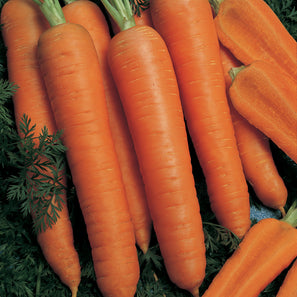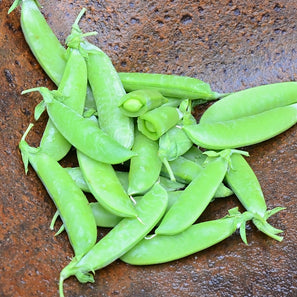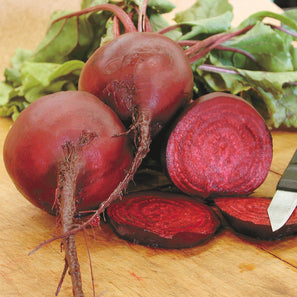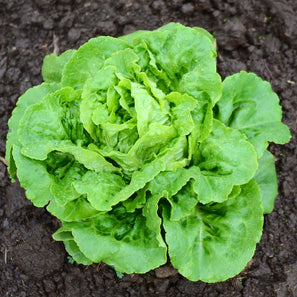A: Please see our shipping policy.
A: Though we cannot guarantee a specific time frame, new orders that are in stock will take approximately 48 business hours to ship. Pre-ordered items such as plants and garlic will ship at their designated time noted in the product description.
Plants are sent out according to the shipping date chosen by you when they are ordered. Since our live plants are dependent on the weather to mature, they can be delayed. We reserve the right to slightly alter the shipping dates if there are maturity problems. Remember, plants are living things and don’t always follow schedules.
Before shipping, each transplant is hardened-off in the crisp night air of our short season farm. When they arrive at your door, they're ready for your garden.
Garlic and shallot bulbs are shipped ONLY in the fall—September through mid-October, depending on the season and the variety.
Commercial orders are custom-filled at the time of purchase and ship times are dependent upon the availability of seed, germination tests, and the time of year. Please allow 2-3 weeks for your order to ship.
Credit card orders are charged at time of purchase for all items. This includes pre-orders for garlic, transplants and items shipped at a later date. If an item becomes unavailable we will do our best to replace it with an item of equal or greater value. If a replacement is unavailable we will issue a refund.
Due to the South Dakota v. Wayfair Inc. decision all direct to consumer businesses, including our segment of the seed industry, must collect sales tax on orders to states that now require it. Because of the ambiguity of the decision states are able to impose immediate tax collection requirements, which we must comply with, without any warning or grace period. We are doing our best to make this as easy as possible for our customers.
To ensure correct amount and to avoid delays in shipment use our online checkout to automatically calculate tax.
If you have a resellers certificate or other agriculture exemption please provide it prior to placing your order, as you are not subject to sales tax.
Sales tax cannot be refunded after the order is placed.
To be set up as a tax-exempt customer you will need to submit a resale certificate/sellers permit or an exemption certificate prior to placing an order with us. You also must create an online account that matches the name and address on your certificates. Once your certificate has been submitted to us it will be reviewed within 5 business days, and the exemption will be added to your account. You will then be able to place orders without being charged tax.
An order placed without sending the appropriate forms will be charged tax, which cannot be refunded.
Submit exemption forms here:
Email:
info@territorialseed.com
Fax:
888-657-3131
Mail:
Territorial Seed Customer Service
PO Box 158
Cottage Grove, OR 97424
At this time we are currently only shipping to the United States and Canada.
Please include a note with your order saying you don't receive mail at your physical address. If you have a PO Box, include that as well. We will either ship USPS to your PO Box (if applicable) or FedEx to your physical address.
We request a physical address whenever a Post Office Box address is given as your billing address in case we need to use FedEx or UPS for a physical delivery. If you need your order shipped to your Post Office Box, please include a note with your order.
We try to respond to emails within 48 hours. If you do not receive a reply, spam filtering software may be blocking our email from getting to you. Please make sure you are emailing info@territorialseed.com and not responding to an automated email. If you are expecting an email from us, but have not received a response within 2 business days, please feel free to call us at: 800-626-0866.
Territorial is just a host for the Garden Planner program and any technical help needs to be handled through their tech support. Click here to send them a request.
Yes! All donation requests for your organization must be submitted in writing. Please see our Donation Request policy for more info.
Our seed is offered in many retail locations around the country, and we would love to have you on board! Please call 877-872-7333 and ask to speak to our Seed Rack Sales Coordinator.
Click on the cart icon in the upper right corner of the website. This will open a full screen shopping cart page. You can then use the “-“ and “+” buttons to remove or add items to the cart. Once you're done making adjustments, make sure to scroll to the bottom of your cart and click the "update" button.
From a desktop:
Click on or hover over the “Login” button in the top right corner of the website. This will open a window that will allow you to enter your email address and password for your account.
From a mobile device:
Click on the menu icon in the upper left hand corner and then select "Login". This will take you to a page that will allow you to enter your email address and password for your account.
If your account was created prior to November 18th, 2019 you will need to create a new account. Our new website did not allow us to keep accounts created on our previous website.
It's also possible when placing an order you checked out as a guest and didn't set up an account. You can create an account here.
From a desktop:
The quickest way to reset your password is to log out of your account, click on or hover over the “Login” button in the top right corner of the website, and click the “Forgot Password?” link. You will then receive an email that will allow you to reset your password. We currently do not have a way to reset your password if you are logged into your account.
From a mobile device:
The quickest way to reset your password is to log out of your account, click on the menu button in the top left corner of the website, click "Login", and then click the “Forgot Password?” link. You will then receive an email that will allow you to reset your password. We currently do not have a way to reset your password if you are logged into your account.
Seed count is different for each variety. The approximate seed count can be found on the item page in the More Information tab below the product’s description.
NOTE: Some varieties list the seed count in the product descriptions if each variety within a category has a different count. Some seeds are sold by seed count which will be stated in the product’s pricing in the size column.
Seed life is different for each species. The approximate seed life can be found in the More Information tab below the product’s description.
Seed that has been coated with a clay-based material to form a uniform, larger, rounded shape. The coating makes planting by hand or mechanical seeder easier and allows more controlled sowing of small seeds such as such as carrots or lettuce. All of our pelleted seed have a National Organic Program (NOP) approved coating.
For best results, store pelleted seed in an air-tight container and use within one season.
Seed tapes are perfectly straight rows of precisely spaced crops. No more having to thin seedlings! This biodegradable tape will plant a row 5 meters (16 feet, 5 inches) long. Simply lay it in a furrow and cover with a light layer of sifted compost or soil, water and wait. Save yourself a heap of planting time with these popular vegetable and herb staples.
We’ve selected a collection of our favorite herb varieties and put them into handy, easy to plant, biodegradable disks. Each 10 cm disk is sized just right to conveniently plant in a 4 inch pot. For windowsill, patio and even herb garden planting, lay the disk on the surface of the moistened planting medium and cover lightly. Water and watch your herbs grow. These disks are a great gift or a perfect child's gardening project.
Grafted vegetables are created when the top part of one plant (the scion) is attached to the root system of a separate plant (the rootstock). The rootstock contributes vigor and disease resistance while the scion is chosen for fruit flavor and quality. Vigorous rootstock enables more effective uptake of water and nutrients and increases the plants’ resistance to pests or disease, and the tolerance to temperature extremes and drought.
This word literally means virgin fruit. Parthenocarpic vegetable varieties have the ability to produce fruit without being pollinated. These fruits will also be seedless. The most common fruiting vegetables for which parthenocarpic varieties can be found are cucumbers, tomatoes, summer squash, and eggplant. In the case of cucumbers, the fruit will be seedless if kept in isolation from other pollen-producing varieties. With other vegetables, parthenocarpy allows earlier fruit formation (often in less-than-ideal conditions), but under normal circumstances will eventually produce seeded fruit due to normal pollination activity.
Heirloom is a descriptive term with no definitive definition. At Territorial Seed, we categorize a variety as an heirloom if it is from pre-World War II, open pollinated, and has a history of being preserved and passed down through the generations. In other words, heirlooms are time-tested favorites.
This indicates that a variety is open-pollinated.
An open-pollinated variety will produce new plants that are "true to type" or just like the parent plant, as long as it has not cross-pollinated with another variety. You can save seed from open-pollinated varieties.
This is the symbol used to indicate that a variety is a hybrid.
Seed that is noted to be a hybrid would be the result of pollen from one variety fertilizing the flower of another variety; cross pollination. You would not want to save seed from a hybrid as it would not grow "true to type" to the plant you saved the seed from.
Quality is never an accident; it’s always a result of dedicated effort, and we believe traditional, high-quality open-pollinated varieties are worth the effort. Existing open-pollinated seed varieties need care and attention to ensure the desired original characteristics are preserved. In our Organic Conservation Breeding Program we select varieties for their original positive attributes, and continuously adapt them to the organic growing conditions. Territorial Select Strains are unique organic seed varieties that are the result of this program. Many of our varieties have been grown and selected under organic conditions for over 25 years and are well adapted to low-input farming and gardening practices. We are committed to providing the broadest possible range of proven true-to-type, high quality organic seed varieties for home garden and professional organic farming.
Look for the varieties with the Territorial Select icon, for seed grown at our organic farm from our Organic Conservation Breeding Program.
We base our zones off the USDA Plant Hardiness Zone Map. You can find out what zone you live in here.
No! We are a 100% non-GMO company, and are signers of the Safe Seed Pledge. The Safe Seed Pledge can be found towards the bottom of the About Us page.
No! Territorial is a privately held company, wholly owned by Tom and Julie Johns. To learn more about our company, please visit the About Us page.
Territorial’s Original Complete Organic Fertilizer Recipe
A home gardeners guide on making and using organic fertilizer.
4 parts seed meal or fishmeal
1 part agricultural lime or dolomite
1 part ⅓ rock phosphate, ⅓ bone meal, ⅓ kelp meal
To use an organic fertilizer in a cost effective manner, spread the fertilizer around the plant or incorporate it into the soil to a depth of 4–16 inches.
Below seeds, we recommend making a 3 ½ inch deep furrow, sprinkling complete organic fertilizer in the bottom of the furrow and covering the fertilizer with soil.
Sow the seeds on top of this soil, then cover the seeds as necessary.
Above is a formula for a complete and well-balanced fertilizer. All quantities are in volume, so the items may be scooped out. Mix thoroughly and store in a dry place.
Seed meal means any kind of ground-up seed, which is usually a by-product of oil making. Cottonseed, soy, canola and linseed meals are usually available. Cottonseed is the most inexpensive and is easy to work with. Fish meal tends to have a strong odor. All these meals are high in nitrogen, contain moderate amounts of phosphorus and are weak in potassium.
Agricultural lime should be finely ground (65–100 screen) so it acts quickly. Do not use quick, hydrated, or slaked lime for fertilizing purposes. Use dolomite lime sparingly as it’s 50% lime and 50% magnesium. Bone meal and rock phosphate are effective phosphate fertilizers. Bone meal is faster acting, but is more costly and tends to become lumpy. Kelp meal adds potassium and most necessary trace elements.




